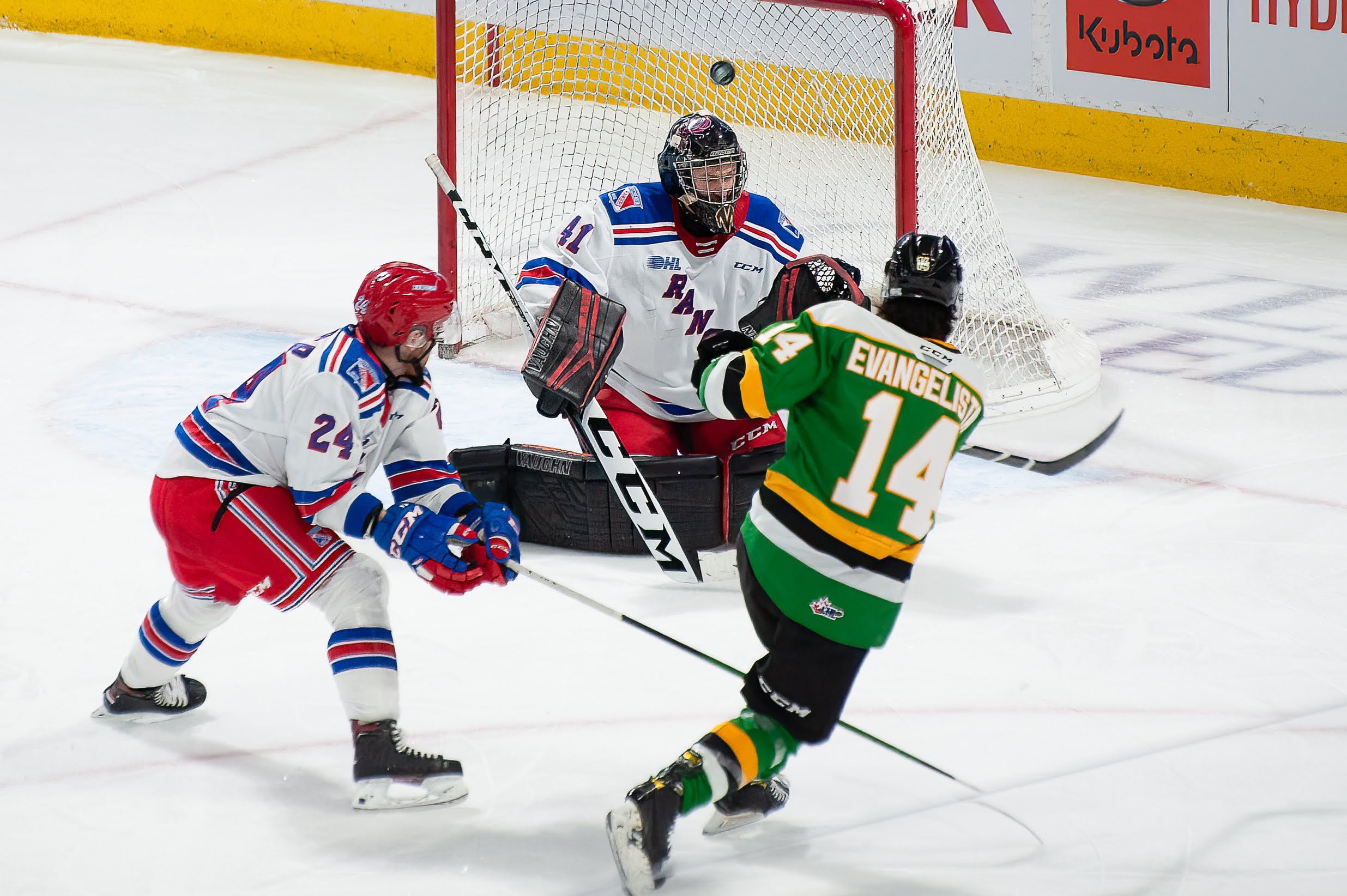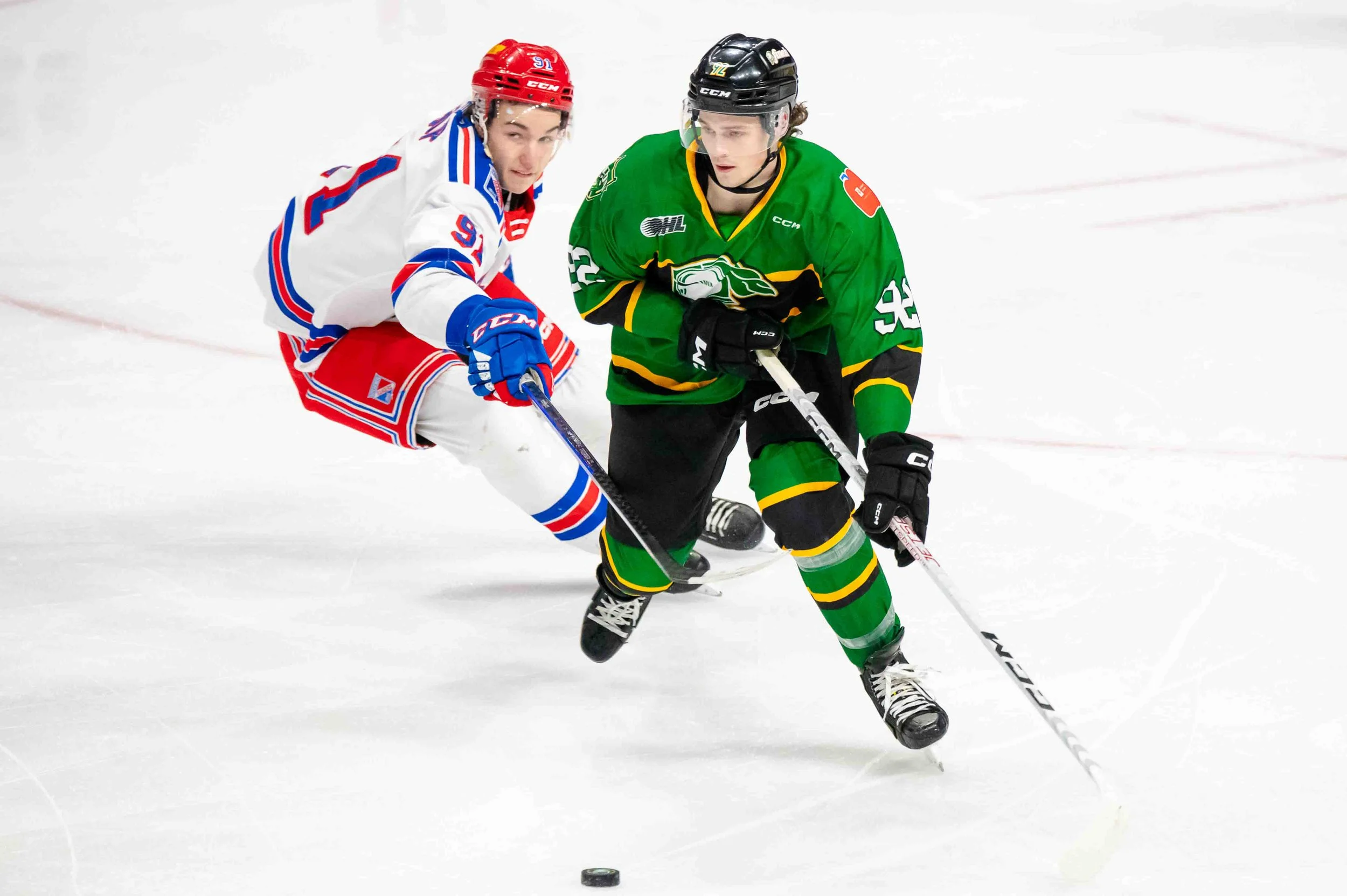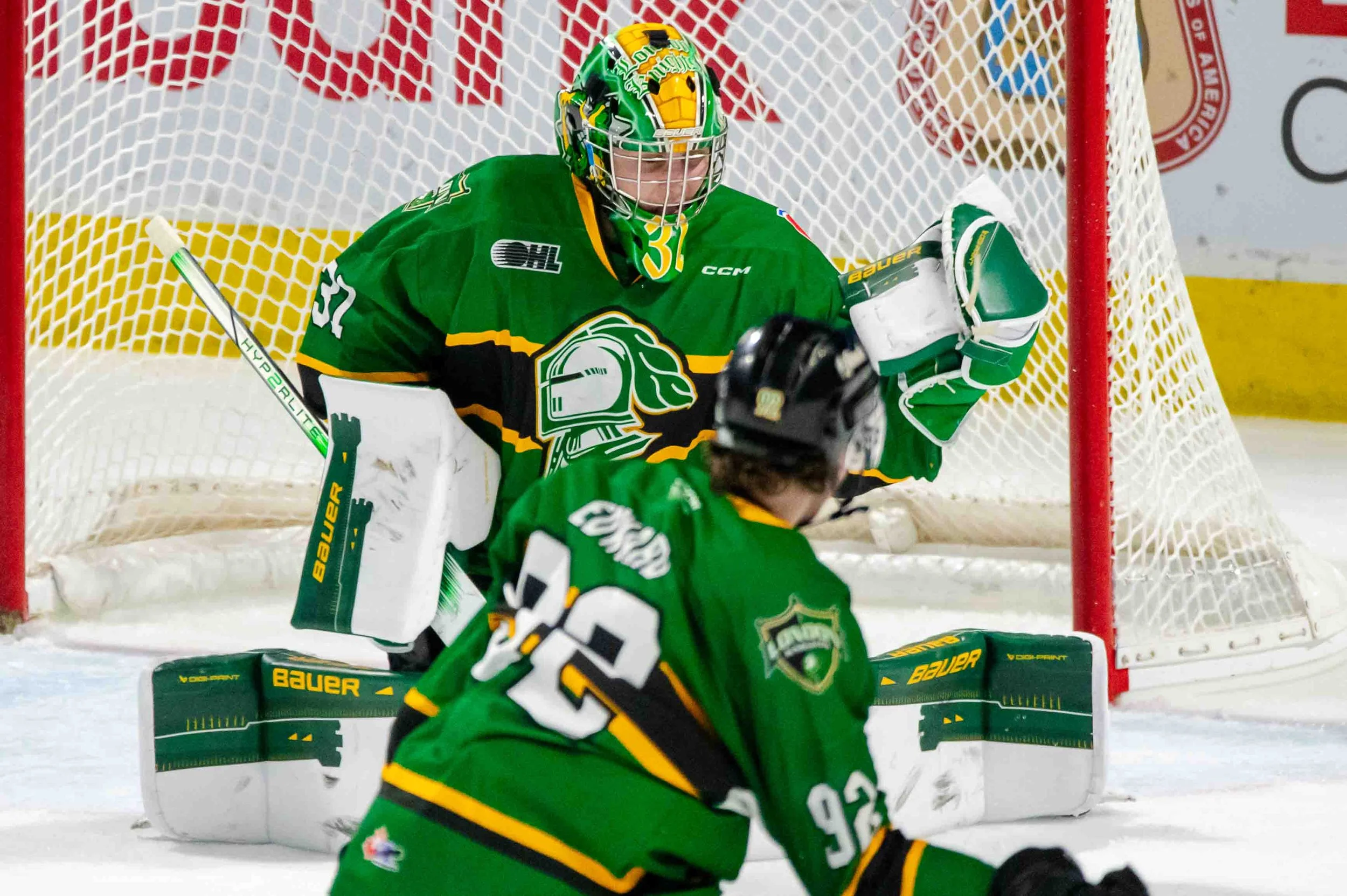What went wrong? A Knights season ended early
They got their star goalie back, but it wasn’t enough. With the dust settled, columnist Jake Jeffrey investigates why the Knights were bounced in the first round — and where they go from here.
(Photo: Matt Hiscox Photography).
* * *
It was no ordinary season. Returning to play for the first time since March 2020, and at times playing in front of no fans due to COVID-19 restrictions, the London Knights navigated their way through an up-and-down 2021-22 OHL campaign. Truthfully, to be playing at all was no small victory. But when the dust settled, it was also true that it was a season in which fell short of expectations.
It ended, of course, with a Game 7 loss at home, in overtime, to the Kitchener Rangers on May 4 in the first round of the playoffs. That 4-3 loss was the culmination of an exciting, hard-fought matchup between the No. 2-seeded Knights and No. 7 Rangers. It was close throughout. In the seven games, both teams scored a total of 23 goals apiece.
Heartbreaking finish aside, there were victories throughout the season for the Knights, to be sure. Despite their early playoff exit, the team was able to capture its 11th Midwest Division title in the last 20 years.
But though finishing atop the Midwest has traditionally transferred to playoff success, that wasn’t the case this time around. In fact, for the Knights, it was the first time since 1989-90 that they’d lost in the first round after finishing atop their division (the Emms Division, at the time).
How did it happen? There’s a strong argument to make that their spot atop the Midwest this year was a bit misleading.
London won 39 games this season, finishing with a 39-22-5-2 record in 68 games. They won the same number of games in 2017-18, a year they finished third in the Midwest (and also had their season end with a first round playoff departure).
Much credit is due the Rangers, who were able to keep Knights scoring star Luke Evangelista in check — and limit London’s offense overall. Evangelista, who was second in the OHL with 1.79 points per game during the regular season, was held under a point per game during the seven-game series against Kitchener, and he only had two points at even strength — a far cry from his seven goals and 19 points during the 10 regular season meetings between the two teams.
And maybe it ends there. Antonio Stranges had a breakout series of sorts with five goals and 11 points in the six games he played, but London’s offense all year was driven by Evangelista, who led the league with 55 goals. Throughout the season, if Evengelista had a tough time scoring, the Knights had a tough time winning. And that’s the way it played out against Kitchener this spring.
The series win for the Rangers capped off a remarkable turnaround for the team, considering how dominant London had been against them during the first half of the season. The latter half, though, was a much different story, and Kitchener carried that momentum into their seven-game series win.
The latter half was a different story altogether for the Knights, who struggled to find consistency after a season-opening nine-game winning streak and a big early lead in the division through the first couple of months. Notably, the knee injury to their star goalie, Brett Brochu, derailed things and had London on their heels during the stretch run. Out 44 days, the netminder returned for the playoffs, but even if he were 100 percent, it was a lot to ask for him to be at the top of his game after being out of action for so long. Ramping things up for the postseason is no easy task.
Kitchener did a great job keeping Knights star Luke Evangelista in check during the playoffs. London’s captain scored an OHL-best 55 goals during the regular season. (Photo: Matt Hiscox Photography).
* * *
Perhaps the best way to look at London’s season is in three parts. The first third, prior to Brochu leaving for the World Juniors, they had their star goalie in the crease for 22 of their first 23 games to start the season. They won 17 of those games. After returning from the tournament, Brochu started 20 of 22 games before getting injured (London won 15 games during that span). The Knights then played the last 20 games of the season without him. He was lights out to start the season, and looked a bit more human in the second third of the year and in the playoffs.
Lack of depth was also a big factor for the Knights in 2021-22 — both up front and on the back end. If teams were able to make life difficult for Evangelista, they tended to have success against London. Four Knights forwards (including Stranges, Sean McGurn and Cody Morgan) were above a point per game this year, but after that scoring dropped off significantly, with the rest of the team registering a point every two games — or less.
On more than a handful of occasions, injuries and suspensions on defense resulted in the coaching staff having to get creative, often moving forwards back to the blue line, or giving younger players more and more responsibility, which is a tall task for many.
And you could certainly argue that lack of goaltending depth hurt London. Playing without their star netminder for a month and a half to finish the season was tough for the team heading into the playoffs. While playing a host of goaltenders from the Junior B circuit, they lost several games to teams that a division leader had no business losing to. In some of those cases, they were simply outchanced and outplayed, but in many others, more experienced goaltending could have made the difference.
It was also strange to see the Knights so quiet at the trade deadline, not adding big pieces for a deep playoff run. It was certainly a bit head-scratching given that the team was leading the division and had threatened the top of the Western Conference for much of the season prior to the deadline. It seemed they were a piece of two away from being elite, though, and those pieces were not acquired.
To be fair, a big reason for that could have been a lack of available options, of course, or that the team didn’t want to part ways with their young talent. That might look like a smart decision next year, as that young talent will be needed to pick up the offensive slack left by top scorers Evangelista and Stranges, who are both expected to move on to the professional ranks.
The list of players moving into those key scoring roles next season begins with overager candidate Sean McGurn, who enjoyed a breakout year in 2021-22, as well as San Jose Sharks prospect Max McCue. Defensemen Gerard Keane and Logan Mailloux, meanwhile, both have the potential to provide reliable point production from the back end.
Landon Sim, Brody Crane and import Ruslan Gazizov will also be relied upon more heavily for offense next season. By the end of the year, both Easton Cowan and Oliver Bonk were playing a regular shift during the playoffs after solid 16-year-old seasons in the GOJHL. Along with Denver Barkey, who played significant minutes as a rookie this season, that trio is a solid group of 2005-born players to build around.
And the work begins now. With the heartbreak of their Game 7 loss settled, the offseason is underway for Knights players. And while they won’t be hoisting an OHL championship trophy or Memorial Cup this year, they’ll get an early start on their preparations for 2022-23.
The work never ends, especially for the perennially-contending London Knights. What will that work produce in 2022-23? We’ll begin finding out in the fall, when the green and gold returns to the ice — hopefully in a COVID-free, sold-out Budweiser Gardens.











The OHL Finals features London and Oshawa. It’s the West champion versus the East winner — with a trip to the Memorial Cup on the line. What’s in store? Our hockey columnist, Jake Jeffrey, breaks it down …